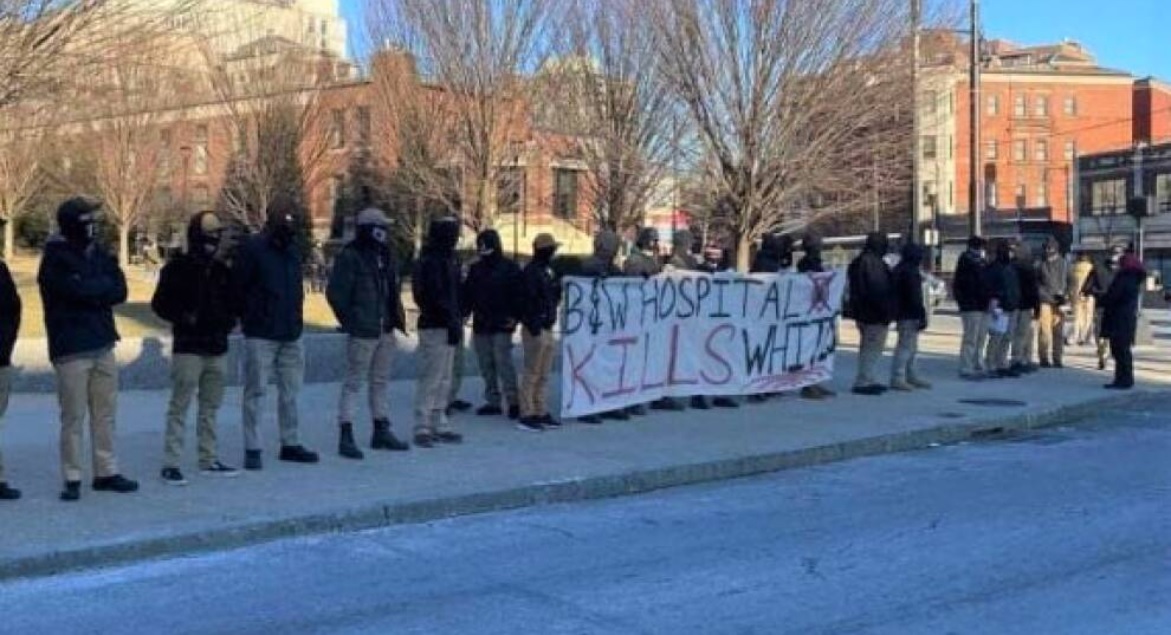Neo-Nazis target anti-racist doctors at Brigham and Women’s Hospital, calling them ‘anti-white’

White nationalist protesters gather outside Brigham and Women’s Hospital during a rally Jan. 22, 2022. (Image courtesy of observer who asked not to be identified by name / GBH News)
On Saturday, Jan. 22, about two dozen white nationalists dressed in identical beige khaki pants and dark hoodies protested in front of Brigham and Women’s Hospital in Boston holding a bedsheet with black lettering reading “B and W Hospital Kills Whites.”
They passed out flyers condemning by name two doctors associated with the hospital and Harvard Medical School who have been working with Mass General Brigham to establish greater equity in health care for non-white communities.
One of the doctors, Dr. Michelle Morse, teaches at Harvard Medical School and is chief medical officer for the New York City Health Department. She was formerly on staff at Brigham and Women’s.
The other, Dr. Bram Wispelwey, is an internal medicine and public health doctor at Brigham and Women’s and also teaches at Harvard Medical School.
Photographs of Morse and Wispelwey — a Black woman and a white man — were featured in the leaflets that were passed out at the Brigham demonstration, condemning what the far right-wing protestors called “preferential health care policies for non-white patients.”
What they and other conservative activists describe as anti-white, Morse and Wispelwey say is simply a new approach to medicine that addresses the health concerns of those who have consistently been left behind as modern medicine advanced.
BRINGING EQUITY TO MEDICINE
“What I’m trying to do is hold the medical industrial complex accountable for the harms that it’s caused to communities of color and to other communities and push for racial justice and health equity in all of the institutions that I’m involved in and in partnership with the many communities that I serve,” Morse told GBH News. “And I think ultimately in the COVID era, part of what that means is a real serious push to make inequities more visible.”
Wispelwey said his team found it was hard to address institutional racism in medicine — such as disparities in how patients are admitted for heart surgery — using “racially blind” methods. “And so we wanted to take a race-explicit approach,” Wispelwey told GBH News. “We can’t wait until these predominantly white institutions sort of come around … we want to actually make sure our patients are taken care of in the best way possible right now.”
Wispelwey and Morse were among a group of doctors at the Brigham in 2015 who questioned why data showed Black and Latinx patients with heart failure were more likely than white patients to end up in general medicine rather than the cardiology unit, where patients have better outcomes. That led to a study that showed a probable link between institutional racism and heart failure; consequently a program was established at Mass General Brigham that aims to improve access for Black and Latinx patients who historically have not had equitable access to specialized cardiology care.
That program is one of many initiatives developed by Mass General Brigham under the heading United Against Racism that serve as roadmaps for delivering services to underserved communities.
Morse and Wispelwey published an article in the March 2021 Boston Review, titled “An Anti-racist Agenda for Medicine” that laid out their approach to health care based on a medical model of critical race theory, and calling for “medical restitution” for Black people, who have long been excluded from first rate care. The doctors were promptly denounced by a guest on Tucker Carlson’s Fox News program, who derided their advocacy for prioritizing non-white patients for certain procedures as “political eugenics.”
A reader posted The Boston Review article on Twitter where it received hundreds of retweets, including, Morse said, “by some right wing person, basically describing Bram’s and my work as racist or as somehow unfair to white people.”
“This is what triggered this whole backlash,” Wispelwey said. He said the intimidation began in the spring of last year with “really extensive threats, not just to us personally, but to our hospital. And then most recently last week when a white nationalist and neo-Nazi group showed up at our hospital.”
Read the rest of this story and hear the audio version at WGBH.org.
